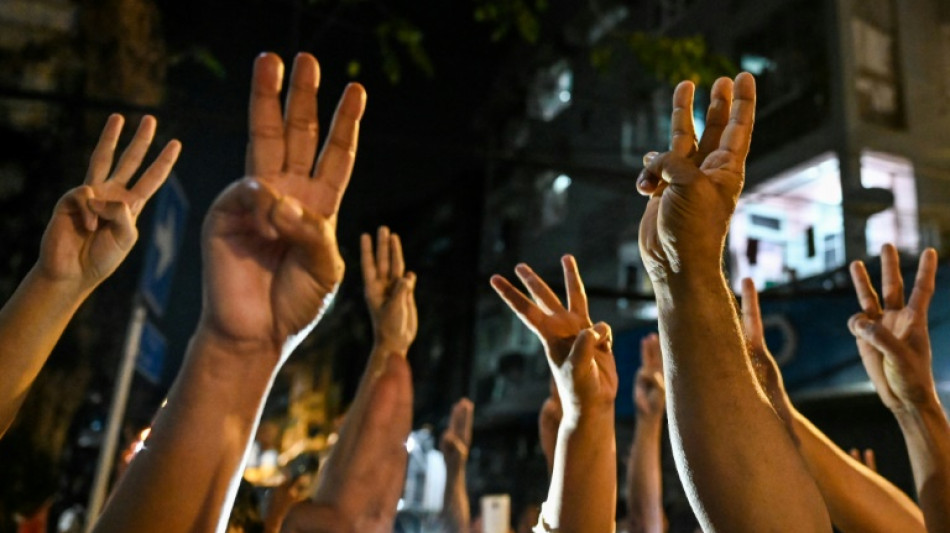

Myanmar protesters defy junta with strike and clapping protests on coup anniversary
Anti-coup protesters across Myanmar defied a junta order not to mark the first anniversary of the military's power-grab with a silent strike and clapping protests on Tuesday, AFP correspondents said.
The military takeover that ended the Southeast Asian country's brief democratic interlude and toppled civilian leader Aung San Suu Kyi has triggered mass protests and a crackdown on dissent.
Struggling to contain the backlash and contending with daily clashes, the junta has killed more than 1,500 civilians, according to a local monitoring group. Swathes of the country are under the control of anti-coup fighters.
Residents across commercial hub Yangon and in the second city of Mandalay clapped en masse at 4 pm (0930 GMT), AFP correspondents and locals said, marking the end of a "silent strike" against the coup.
"We were clapping," one Mandalay resident said. "Other houses in my neighbourhood clapped as well."
The junta had ordered shops to stay open Tuesday but the streets of Yangon began emptying at 10 am, a scene that was repeated in Mandalay and the southern Tanintharyi region.
Mandalay's famous jade market had opened in the morning, but saw little traffic, a resident told AFP.
"No one is going out on the streets around my area and security forces are patrolling," the resident said.
"I'm staying at home playing online games to participate in the silent strike."
A similar shutdown in December emptied the streets of cities and towns across the country.
On Tuesday morning, local media showed isolated flashmobs in Yangon and Mandalay, where protesters unfurled pro-democracy banners and set off flares.
Ahead of the anniversary, the junta had threatened to seize businesses that shutter and warned that noisy rallies or sharing anti-military "propaganda" could lead to treason or terrorism charges.
In comments published Tuesday, junta chief Min Aung Hlaing repeated the military's claim that it had been forced to take power following election fraud by Suu Kyi's party in a 2020 vote that international observers said was largely free and fair.
Fresh polls will be called once stability is restored, Min Aung Hlaing told the state-run Global New Light of Myanmar newspaper.
The junta's information team released undated video handouts on Tuesday showing pro-military demonstrations in unspecified parts of the country, some holding national flags and chanting slogans in support of the army.
Others held banners denouncing the "People's Defence Forces" that have sprung up to fight the military and dealt painful blows to junta troops with guerilla ambushes and mine attacks.
"If the strike is shaping up as is reported, it is a thunderous silence, a resounding rebuke of military rule," David Mathieson, an analyst formerly based in Myanmar, told AFP.
- Sanctions -
The United States, Britain and Canada unveiled coordinated sanctions on Myanmar officials Monday, including those involved in Suu Kyi's trial.
Washington sanctioned Attorney General Thida Oo, Supreme Court Chief Justice Tun Tun Oo and Anti-Corruption Commission chairman Tin Oo, all of whom it said were closely involved in the "politically motivated" prosecution of Suu Kyi.
"We are coordinating these actions with the United Kingdom and Canada... to further promote accountability for the coup and the violence perpetrated by the regime," US Secretary of State Antony Blinken said.
Citing "unspeakable violence against civilians", the undermining of regional stability and "rampant" corruption, US President Joe Biden said he was working with allies to "hold accountable" those responsible.
- Another trial for Suu Kyi -
Suu Kyi has been detained since the coup and so far sentenced to six years in prison for illegally importing and owning walkie talkies, incitement against the military and breaking Covid-19 rules.
The Nobel laureate faces a raft of other charges, from election fraud to breaching the official secrets act, and faces over 100 years in jail.
On Monday, ousted Myanmar lawmakers from a shadow "National Unity Government" dominated by members of Suu Kyi's party addressed the media in Paris.
Human rights spokesman Aung Myo Min urged the international community to implement an arms embargo and tighten economic sanctions to cut off all trade with the regime.
Following Washington's lead, Britain imposed sanctions against Thida Oo, Tin Oo and chair of the election commission Thein Soe.
"The Burmese military are using ever more brutal and desperate tactics to try to cling on to power," said Anna Roberts, head of activist group Burma Campaign UK.
"It is vital to maximise pressure now while the military are more vulnerable."
burs-rma/pdw/dva
M.Vecchiarelli--LDdC



